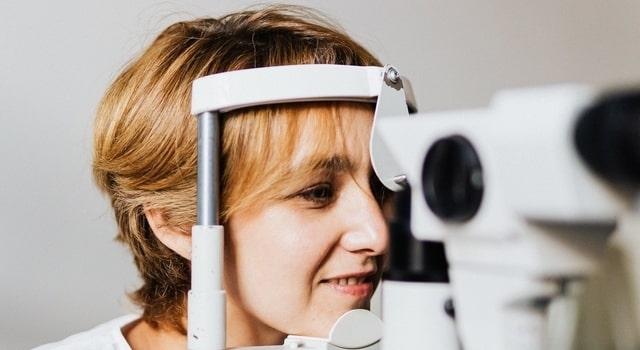
When it comes to eye care, many people assume that all eye exams are the same. However, there’s a significant difference between a basic vision check and a comprehensive eye exam. While both serve important functions, only a comprehensive exam provides a complete evaluation of your vision and eye health.
At Omni Eye Specialists, we believe in the importance of thorough eye care, so let’s explore what happens during a comprehensive eye exam and how it differs from a simple vision check.
What Is a Basic Vision Check?
A basic vision check is typically a quick test that measures how well you can see. This is often done during a routine visit to the doctor’s office, at school, or at the DMV.
The goal of a basic vision check is to determine whether you need corrective lenses, such as glasses or contact lenses. Here’s what it usually includes:
- Visual Acuity Test: This test uses the familiar Snellen eye chart (the one with letters of different sizes) to measure how clearly you can see at various distances. You’ll be asked to read the letters while covering one eye at a time.
- Refractive Error Detection: If you have difficulty seeing clearly, the test will identify whether you have a refractive error, such as nearsightedness, farsightedness, or astigmatism. If needed, you’ll be referred for a more in-depth exam to determine your prescription for glasses or contacts.
While a basic vision check is a good starting point, it only measures how well you can see. It doesn’t assess the overall health of your eyes or check for conditions that could lead to vision loss.
What Is a Comprehensive Eye Exam?
A comprehensive eye exam, on the other hand, is a much more detailed assessment of both your vision and eye health. Conducted by an optometrist or ophthalmologist, a comprehensive exam includes a variety of tests and evaluations that provide a complete picture of your eye health.
Here’s what you can expect during a comprehensive exam at Omni Eye Specialists:
Patient History Review
The exam begins with a review of your medical history, medications, and any vision problems you’ve experienced. This helps the optometrist understand any risk factors for eye conditions, such as family history of glaucoma, diabetes, or hypertension.
Visual Acuity and Refractive Testing
Like a basic vision check, a comprehensive exam includes a visual acuity test using the Snellen chart. However, the exam goes further by testing for refractive errors and determining your exact prescription for glasses or contact lenses.
Eye Movement and Coordination
Your optometrist will assess how well your eyes move and work together. This is especially important for tasks like reading, focusing, and hand-eye coordination.
Eye Pressure Measurement (Tonometry)
To detect glaucoma, your eye pressure will be measured using a device called a tonometer. High eye pressure is a common early sign of glaucoma, a condition that can lead to vision loss if not treated.
Pupil Dilation and Retinal Examination
To get a better view of the inside of your eyes, your optometrist may dilate your pupils using eye drops. This allows them to examine your retina, optic nerve, and blood vessels for early signs of cataracts, macular degeneration, diabetic retinopathy, and other eye conditions.
Visual Field Testing
This test measures your peripheral vision (side vision) to detect any blind spots or other issues that may indicate underlying problems with your eyes or brain.
Slit Lamp Examination
A slit lamp is a special microscope used to examine the front part of your eyes, including the cornea, lens, and iris. This test helps detect conditions such as dry eyes, corneal damage, and early signs of cataracts.
Eye Health Assessment
In addition to checking your vision, a comprehensive eye exam assesses the overall health of your eyes, including the blood vessels, retina, and optic nerve. This can reveal underlying health conditions, such as diabetes, high blood pressure, and cholesterol issues.
Key Differences Between a Comprehensive Eye Exam and a Basic Vision Check
- Depth of Evaluation: A basic vision check only tests how well you can see, while a comprehensive eye exam evaluates both your vision and eye health.
- Early Detection of Eye Diseases: Comprehensive eye exams can detect serious eye conditions like glaucoma, cataracts, and macular degeneration in their early stages, allowing for prompt treatment.
- Overall Health Monitoring: Comprehensive exams can also reveal signs of systemic health conditions, such as diabetes and high blood pressure, that affect your eyes.
- Personalized Treatment: Based on the findings of a comprehensive exam, your optometrist can recommend personalized treatment options, such as vision correction, medication, or lifestyle changes, to protect your eye health.
Request an Appointment for a Comprehensive Eye Exam
At Omni Eye Specialists, we believe in providing the highest level of care for our patients. A comprehensive eye exam offers much more than just a vision check—it’s a vital part of maintaining your overall eye health.
If it’s been more than a year since your last exam or you’re experiencing changes in your vision, don’t wait—request an appointment with us for a comprehensive eye exam and take control of your eye health.
